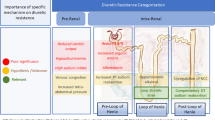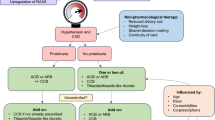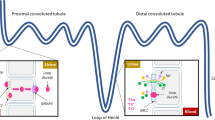Opinion statement
Hypertension is a global public health problem affecting one-fourth of the world’s population. A subset of these patients with resistant hypertension presents a particular management problem and suffers a marked increase in cardiovascular risk. Treatment options have been limited, but the past decade has witnessed the emergence of catheter-based renal denervation to interrupt the sympathetic nervous system, long considered to play an important role in the development and maintenance of hypertension. Phase 1 and 2 studies reported remarkable reductions in blood pressure and sparked an excessive exuberance that ground to a halt with negative results of the SYMPLICITY HTN-3 pivotal trial. The subsequent and sober reappraisal has shed light on potential failure modes. Armed with appropriately cautious optimism, the field has resumed its move forward to realize the potential for therapeutic application in hypertension and other conditions characterized by sympathetic overactivity. This article summarizes the rich experimental data, early surgical experience, and available clinical trial results for catheter platforms. It concludes with discussion of knowledge gaps, lessons learned, and future directions.

Similar content being viewed by others
References and Recommended Reading
Papers of particular interest, published recently, have been highlighted as: • Of importance •• Of major importance
Krum H, Schlaich M, Whitbourn R, et al. Catheter-based renal sympathetic denervation for resistant hypertension: a multicentre safety and proof-of-principle cohort study. Lancet. 2009;373:1275–81.
(2010) Renal sympathetic denervation in patients with treatment-resistant hypertension (The Symplicity HTN-2 Trial): a randomised controlled trial. Lancet 376:1903–1909
Bhatt D, Kandzari D, O'Neill W, et al. A controlled trial of renal denervation for resistant hypertension. N Engl J Med. 2014;370:1393–401.
Mozaffarian D, Benjamin E, Go A, et al. Heart disease and stroke statistics—2016 update. Circulation. 2015;133:e38–e360.
(2015) A Randomized Trial of Intensive versus Standard Blood-Pressure Control. N Engl J Med 373:2103–2116
BernardC (1859) Lecons sur les proprietes physiologiques et les alterations pathologiques des liquides de l'organisme. 170–191
Bradford J. The innervation of the renal blood vessels. J Physiol. 1889;10:358–432.
Sen S. Some observations on decapsulation and denervation of the kidney. Brit J Urol. 1936;8:319–28.
Page IHeuer G. The effect of renal denervation on the level of arterial blood pressure and renal function in essential hypertension. J Clin Invest. 1935;14:27–30.
Smithwick RThompson J. Splanchnicectomy for essential hypertension. J Clin Invest. 1953;152:1501–4.
DiBona G. Physiology in perspective: the wisdom of the body. Neural control of the kidney. AJP: regulatory. Integrative and Comparative Physiology. 2005;289:R633–41.
DiBona GEsler M. Translational medicine: the antihypertensive effect of renal denervation. AJP: Regulatory, Integrative and Comparative Physiology. 2009;298:R245–53.
Campese VKogosov E. Renal afferent denervation prevents hypertension in rats with chronic renal failure. Hypertension. 1995;25:878–82.
O'Hagan K, Thomas G, Zambraski E. Renal denervation decreases blood pressure in DOCA-treated miniature swine with established hypertension. Am J Hypertens. 1990;3:62–4.
Huang W, Fang T, Cheng J. Renal denervation prevents and reverses hyperinsulinemia-induced hypertension in rats. Hypertension. 1998;32:249–54.
Kjeldsen S, Schork N, Leren P, Eide I. Arterial plasma norepinephrine correlates to blood pressure in middle-aged men with sustained essential hypertension. Am Heart J. 1989;118:775–81.
Smith P, Graham L, Mackintosh A, Stoker J, Mary D. Relationship between central sympathetic activity and stages of human hypertension. Am J Hypertens. 2004;17:217–22.
Schauerte P, Scherlag B, Scherlag M, Jackman W, Lazzara R. Transvenous parasympathetic cardiac nerve stimulation:an approach for stable sinus rate control. J Cardiovasc Electrophysiol. 1999;10:1517–24.
Schauerte P, Scherlag B, Pitha J, Scherlag M, Reynolds D, Lazzara R, Jackman W. Catheter ablation of cardiac autonomic nerves for prevention of vagal atrial fibrillation. Circulation. 2000;102:2774–80.
Krum H, Schlaich M, Sobotka P, Böhm M, Mahfoud F, Rocha-Singh K, Katholi R, Esler M. Percutaneous renal denervation in patients with treatment-resistant hypertension: final 3-year report of the Symplicity HTN-1 study. Lancet. 2014;383:622–9.
Sievert H, Schofer J, Ormiston J, Hoppe U, Meredith I, Walters D, Azizi M, Diaz-Cartelle J, Cohen-Mazor M. Renal denervation with a percutaneous bipolar radiofrequency balloon catheter in patients with resistant hypertension: 6-month results from the REDUCE-HTN clinical study. EuroIntervention. 2015;10:1213–20.
Verheye S, Ormiston J, Bergmann M, Sievert H, Schwindt A, Werner N, Vogel B, Colombo A. Twelve-month results of the rapid renal sympathetic denervation for resistant hypertension using the OneShotª ablation system (RAPID) study. EuroIntervention. 2015;10:1221–9.
•• Tsioufis C, Papademetriou V, Dimitriadis K, et al. Catheter-based renal denervation for resistant hypertension: twenty-four month results of the EnligHTN™ I first-in-human study using a multi-electrode ablation system. Int J Cardiol. 2015;201:345–50. The only prospective single arm study of renal denervation done with a 4 electrode ablation catheter.It does achieve circumferential renal nerve ablation.Data are impressive but need validation in a sham controlled study.
• Kandzari D, Bhatt D, Brar S, et al. Predictors of blood pressure response in the SYMPLICITY HTN-3 trial. Eur Heart J. 2014;36:219–27. Explains the reasons why Simplicity III failed.
Azizi M, Sapoval M, Gosse P, et al. Optimum and stepped care standardised antihypertensive treatment with or without renal denervation for resistant hypertension (DENERHTN): a multicentre, open-label, randomised controlled trial. Lancet. 2015;385:1957–65.
Rosa J, Widimsky P, Toušek P, et al. Randomized comparison of renal denervation versus intensified pharmacotherapy including spironolactone in true-resistant hypertension: six-month results from the Prague-15 study. Hypertension. 2014;65:407–13.
Jung O, Gechter J, Wunder C, Paulke A, Bartel C, Geiger H, Toennes S. Resistant hypertension? Assessment of adherence by toxicological urine analysis. J Hypertens. 2013;31:766–74.
Ewen S, Meyer M, Cremers B, et al. Blood pressure reductions following catheter-based renal denervation are not related to improvements in adherence to antihypertensive drugs measured by urine/plasma toxicological analysis. Clin Res Cardiol. 2015;104:1097–105.
• Sakakura K, Ladich E, Cheng Q, Otsuka F, Yahagi K, Fowler D, Kolodgie F, Virmani R, Joner M. Anatomic assessment of sympathetic peri-arterial renal nerves in man. J Am Coll Cardiol. 2014;64:635–43. Gives anatomical rational for burning distally and into the branches of renal artery.
Tzafriri A, Mahfoud F, Keating J, Markham P, Spognardi A, Wong G, Fuimaono K, Böhm M, Edelman E. Innervation patterns may limit response to endovascular renal denervation. J Am Coll Cardiol. 2014;64:1079–87.
Henegar J, Zhang Y, Rama R, Hata C, Hall M, Hall J. Catheter-based Radiorefrequency renal denervation lowers blood pressure in obese hypertensive dogs. Am J Hypertens. 2014;27:1285–92.
Mahfoud F, Tunev S, Ewen S, et al. Impact of lesion placement on efficacyand safety of catheter-based radiofrequency renal denervation. J Am Coll Cardiol. 2015;66:1766–75.
• Fischell T, Fischell D, Ghazarossian V, Vega F, Ebner A. Next generation renal denervation: chemical “perivascular” renal denervation with alcohol using a novel drug infusion catheter. Cardiovascular Revascularization Medicine. 2015;16:221–7. Provides hope that circumferential ablation can be achieved with alcohol infusion.
Kandzari D, Kario K, Mahfoud F, Cohen S, Pilcher G, Pocock S, Townsend R, Weber M, Böhm M. The SPYRAL HTN global clinical trial program: rationale and design for studies of renal denervation in the absence (SPYRAL HTN OFF-MED) and presence (SPYRAL HTN ON-MED) of antihypertensive medications. Am Heart J. 2016;171:82–91.
de Jong M, Adiyaman A, Gal P, et al. Renal nerve stimulation–induced blood pressure changes predict ambulatory blood pressure response after renal DenervationNovelty and significance. Hypertension. 2016;68:707–14.
Lobo M, Montarello J, Saxena M, Jain A, Walters D, Pincus M, Tsioufis C, Papademetriou V, Worthley S. [OP.4C.04] safety and performance of the enlightn renal denervation system in patients with drug-resistant hypertension. J Hypertens. 2016;34:e48.
De Jager R, Sanders M, Bots M, et al. Renal denervation in hypertensive patients not on blood pressure lowering drugs. Clin Res Cardiol. 2016;105:755–62.
Desch S, Okon T, Heinemann D, et al. Randomized sham-controlled trial of renal sympathetic denervation in mild resistant HypertensionNovelty and significance. Hypertension. 2015;65:1202–8.
Author information
Authors and Affiliations
Corresponding author
Ethics declarations
Conflict of Interest
The authors declare that they have no conflicts of interest.
Human and Animal Rights and Informed Consent
This article does not contain any studies with human or animal subjects performed by any of the authors.
Additional information
This article is part of the Topical Collection on Coronary Artery Disease
Rights and permissions
About this article
Cite this article
Raman, V.K., Tsioufis, C., Doumas, M. et al. Renal Denervation Therapy for Drug-Resistant Hypertension: Does It Still Work?. Curr Treat Options Cardio Med 19, 39 (2017). https://doi.org/10.1007/s11936-017-0536-4
Published:
DOI: https://doi.org/10.1007/s11936-017-0536-4




